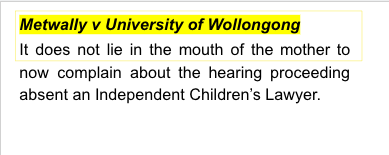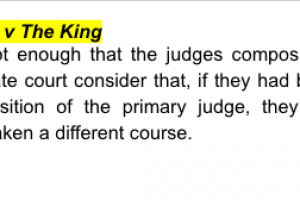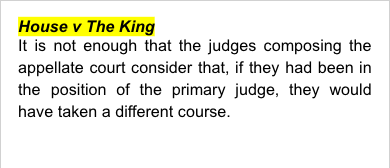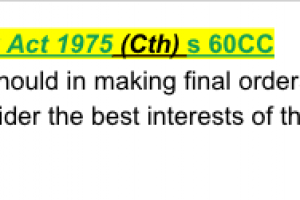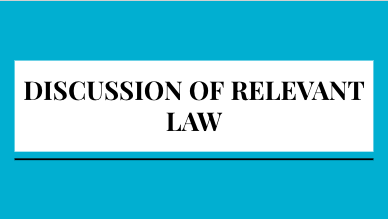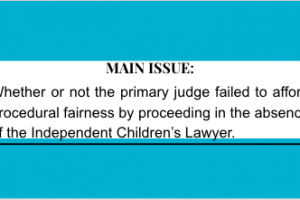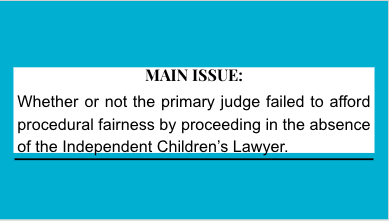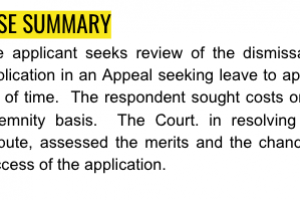- · 4845 friends
Appellant Seeks Leave to Appeal

Andreou & Manellis [2022] FedCFamC1A 107 (14 July 2022)

The applicant seeks review of the dismissal of Application in an Appeal seeking leave to appeal out of time.The respondent sought costs on an indemnity basis. The Court. in resolving this dispute, assessed the merits and the chance of success of the application.

Facts:
The parties' domestic relationship spanned from their marriage in 2007 until their final separation in November 2018, although for a period thereafter they remained living under one roof. During the relationship, three children were born, whose ages are now 10, 7, and 4 (almost 5). The father commenced these proceedings in 2021. In due course, interim parenting orders were made on 28 July 2021, which provided that the children live with the mother but spend time with the father for eight hours each Saturday, and have telephone communication with him each Wednesday.
It is asserted that the trial judge erred and denied procedural fairness to the children and the parties when order had been made for the appointment of an Independent Children’s Lawyer: (a) the Independent Children’s Lawyer did not appear at the hearing on 13 December 2021 and the children were, therefore, denied the benefit of legal representation; (b) she conducted a hearing and made orders without the assistance of legal representation for the children and without the benefit for the children of their own legal representation. It is further asserted that the trial judge denied the children procedural fairness in not adjourning the matter to Allow the children the benefit of being represented by an Independent Children’s Lawyer.
On 5 November 2021, the primary judge made an order appointing an Independent Children’s Lawyer. The Independent Children’s Lawyer did not appear at the 13 December 2021 hearing, for reasons which the material does not disclose, save that it appears that a lawyer might not have been appointed by the New South Wales Legal Aid Commission by then (Transcript 13 December 2021, p.2 lines 35–38). However, on no view did that failure require the primary judge to adjourn the hearing to afford procedural fairness to either party or the putative Independent Children’s Lawyer. Nothing thereafter precluded the parties from adequately presenting their respective cases.
On 13 December 2021, neither party applied to adjourn the hearing. Both parties asserted that the other posed a risk of harm to the children.
By Notice of Appeal filed on 16 February 2022, the mother appeals from interim parenting orders made by a judge of the Federal Circuit and Family Court of Australia (Division 2) on 4 February 2022. In substance, those orders changed the primary care of the parties’ three children from the mother to the father and, after a moratorium of a month, thereafter only permitted the children to spend time with the mother as agreed, or in default of agreement, for seven hours of professionally supervised time on one day per week.

Issue:
Whether or not the primary judge failed to afford procedural fairness by proceeding in the absence of the Independent Children’s Lawyer.

Applicable law:
Family Law Act 1975 (Cth) s 60CC - provides that the Court should in making final orders, the Court should consider the best interests of the children.



Analysis:
The primary judge observed the following: both parties appear to lack insight as to how their behaviour is and will impact the children; neither party appears to be able to shield these children from the parental conflict; there is a risk that the Father has engaged is coercive and controlling behaviour by the placing of tracking devices in the children’s bags; the risks to the children in the Father’s care must then be balanced against the risk of harm in the Mother’s care.
The children are at risk of continuing to witness the parent’s conflict and the Mother’s repeated allegations and subsequent interactions with the Police with respect to the Father. They are at risk of harm that the Mother will continue to involve them in these proceedings.
The conclusions of the primary judge are not plainly wrong, nor otherwise erroneous as explained in House v The King. There is no reason to think that the primary judge ignored the spasmodic supervised time that the mother had permitted the children to spend with the father.
The primary judge was mindful that the mother would not agree that in the future she would necessarily comply with orders requiring the children to spend time with the father. Subsequent submissions filed on 7 July 2022 said that the ignored consideration was the untested nature of the arrangement under the order, i.e. children living with the father and only spending time with the mother. However, there is no reason to think the primary judge was not mindful of that, given her observations
Conclusion:
The appeal is dismissed. There is no reason to think that the mother’s financial circumstances would preclude her meeting costs orders. Whilst the Independent Children’s Lawyer’s Schedule of Costs was filed late, that does not speak against a costs order here. Within 28 days, the appellant is to pay the respondent’s costs in the sum of $9,173.71 and the Independent Children’s Lawyer’s costs in the sum of $2,000.



